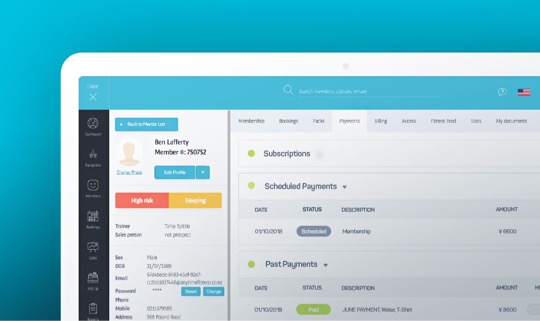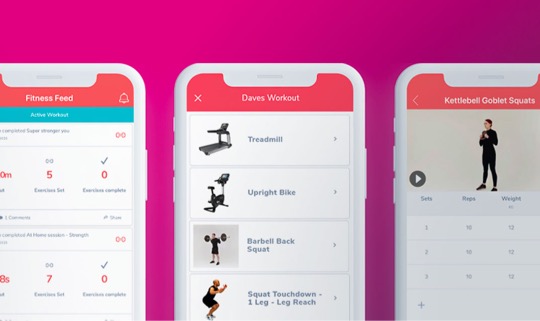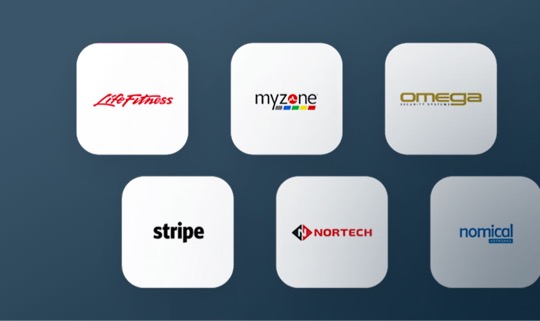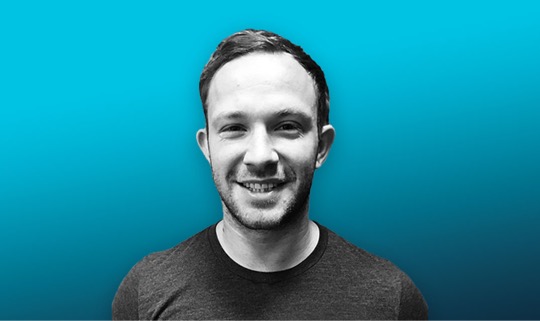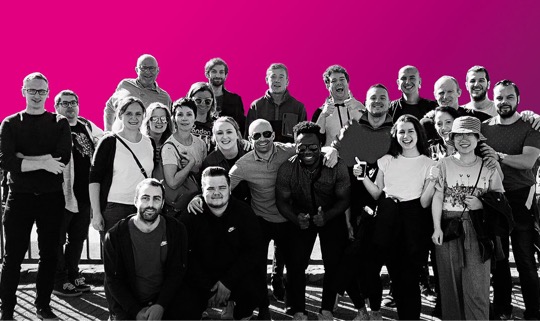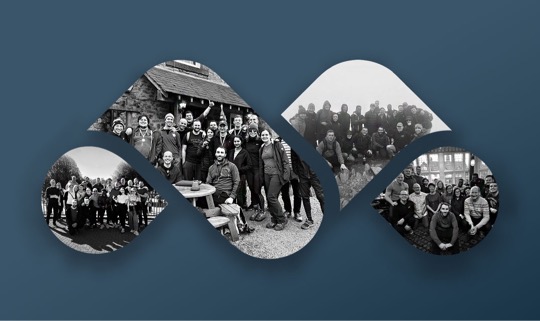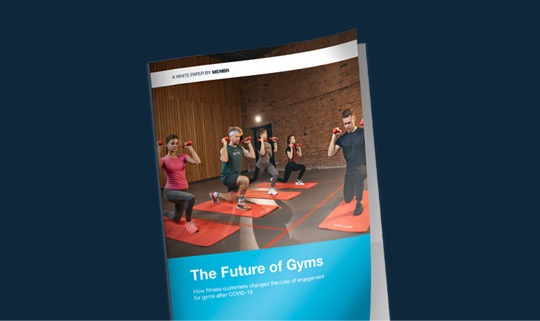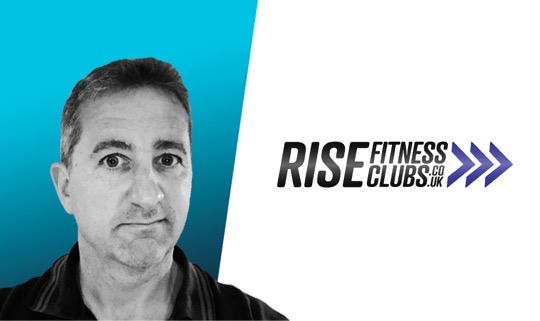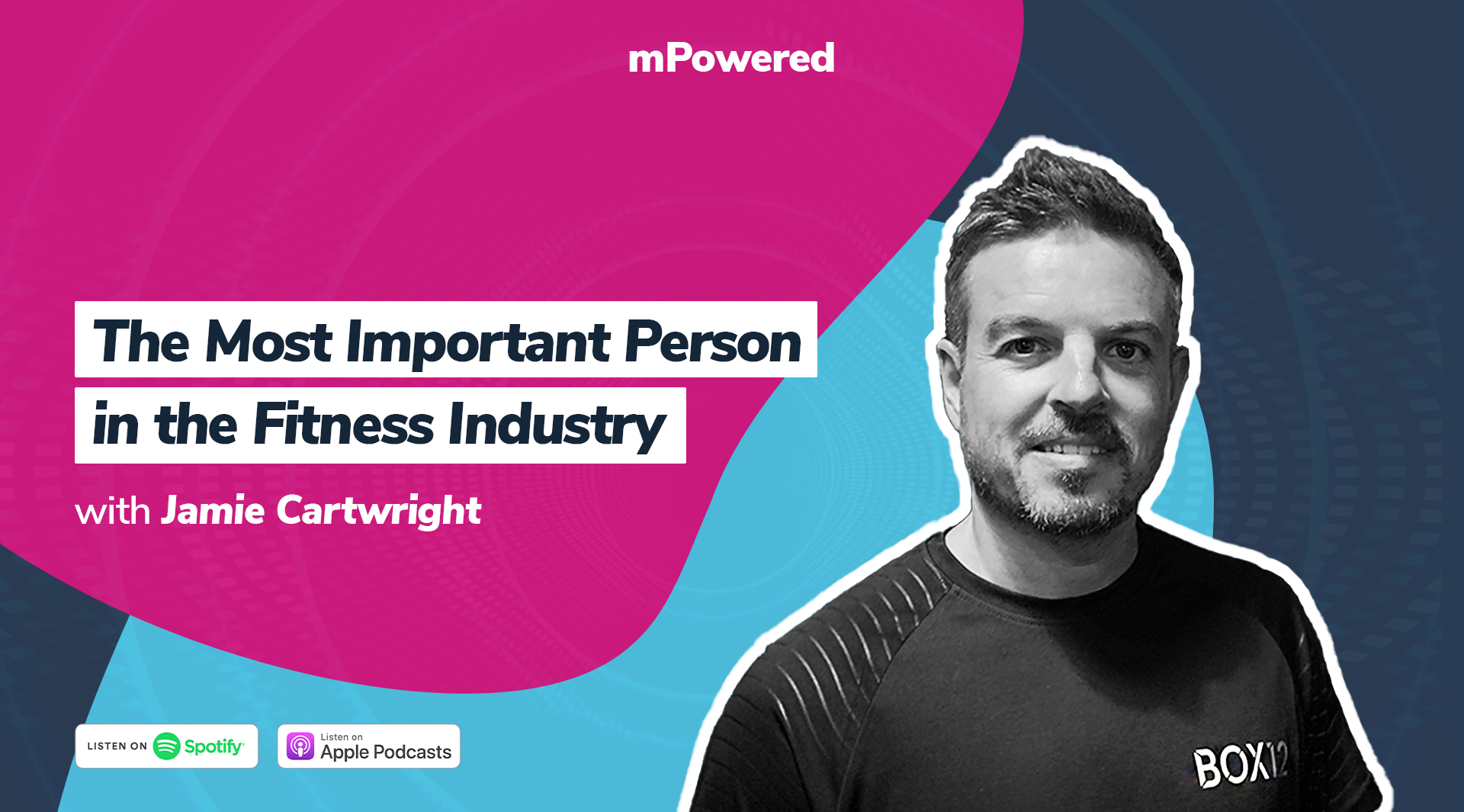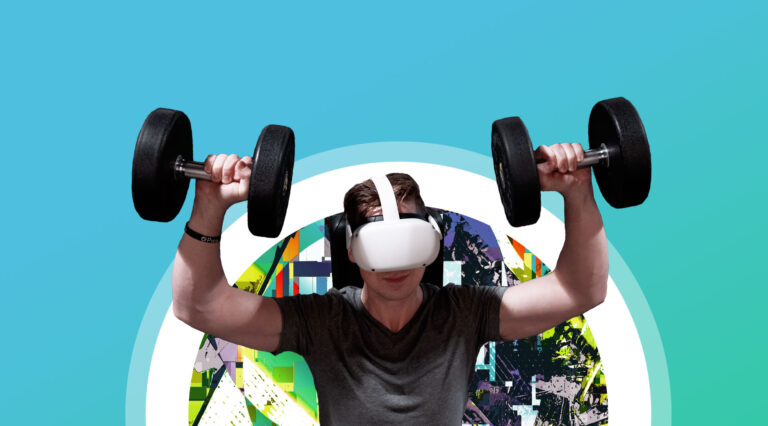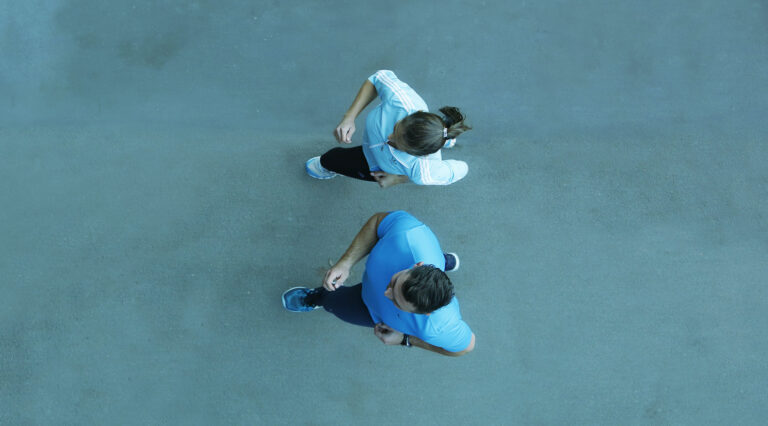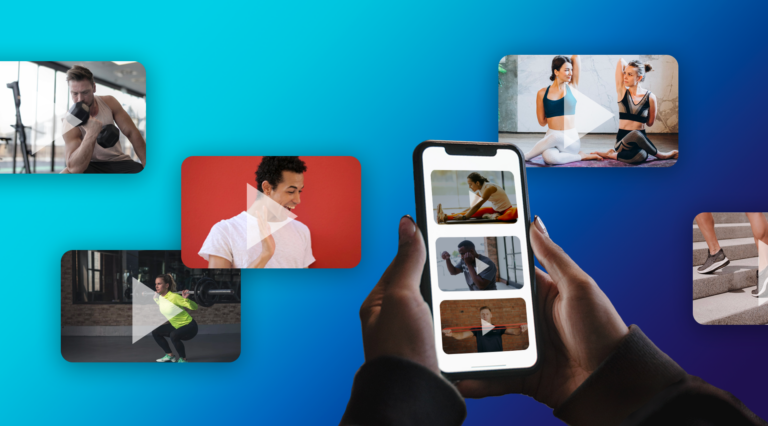[00:00:02] Craig McNeill: Welcome to mPowered. So we are with Jamie Cartwright on this episode. How are you, Jamie?
[00:00:08] Jamie Cartwright: I’m good, mate. Thank you. The sun’s shining, so always makes life a bit easier for everyone, right?
[00:00:12] Craig McNeill: It does. Doesn’t it just! Jamie, I’m excited to talk to you a little bit more about the fitness experience and how we’ve possibly seen a transformation in the fitness experience within our conversation today, before I do so though Jamie, I’ve got to do an intro because your background is pretty phenomenal. You don’t look old enough first and foremost.
[00:00:35] Jamie Cartwright: I feel it!
[00:00:38] Craig McNeill: So Jamie, at the moment you are co-owner of Hatton boxing, co-founder of Box 12 and founder of Move to Freedom. Amazingly, you are one busy guy!
[00:00:51] Jamie Cartwright: Yeah.
[00:00:53] Craig McNeill: How’d you juggle everything. Tell me a little bit more about the three things that you’re doing and more at the moment?
[00:00:59] Jamie Cartwright: So, I mean, and they, I think the important thing is 95% of my time is Hatton Boxing and Box 12. Move for Freedom I’m sure we can talk about that little bit later, it’s more of a, an initiative and something that sits outside my professional life. But most of my time is, is Hatton Boxing and probably Hatton Boxing and Box 12 nowadays is more 75% Box 12, 25% Hatton boxing you know, but yeah, they’re two businesses. They sit in their own, their own lanes.
[00:01:29] If you like, of course, they sit in the boxing for fitness, er sphere, but they, they do have two different, they have two different focuses and but yeah, no, I’ve been busy enough and I’ve got a six year old boy keeps me busy and two dogs and you know, and the most important thing I have to keep the wife happy don’t I so that’s the, that’s the most important thing, but yeah, busy, but I’d have it no other way mate, I lit I literally would have no other way if I’m, I am useless at sitting still for more than 10 seconds. So I’ve got to have my mind and body active it’s best for me and everyone around me. I think!
[00:02:03] Craig McNeill: Isn’t it just? And it just feeds one another doesn’t it? Jamie?
[00:02:06] Jamie Cartwright: Yeah. Yeah.
[00:02:08] Craig McNeill: You’ve been in the industry fitness industry for over 20 years working in different parts of the industry, which I’m sure is the reason why you’re so successful because you can see it from different pockets. So you’ve, you’ve ran your own fitness gym for 10 years. I believe.
[00:02:23] 10 years managing your own gyms?
[00:02:26] Jamie Cartwright: Yeah. Yeah. So I think, you know, you hear this a lot with the people in our industry – we’re in this industry because we love the industry. At the end of the day, we are people people and we like to make people feel good. And we do that through the services that we provide and I’m no different to the majority of people that are in our industry.
[00:02:43] I’m not, I didn’t go through education. I left school at 16. I played football for a living for the first five years of my life. And I ended up on the football scrap heap, you know, but thankfully the professional football association helped me fund my fitness qualifications, like level two fitness instructor, begged for my first job because no one had, you know, would employer a ex-footballer.
[00:03:05] You know, cause we haven’t got any work ethic and this, that, and the other, you know, that kind of stuff. And that, and then as soon as I got on that, got my sort of my teeth into the industry, it was, it was exactly what I wanted to do. Now, the problem of course, with our industry is, it’s not the most well-paid industry to be in if you’re in the sort of delivery of fitness.
[00:03:25] And so. For me to achieve anything that I wanted to do in my life. It was to become more in the business side of, of our industry. And so very quickly, I agree to within, after leaving football within four years, I, I started my own ladies-only gym in Sheffield with a best, with a best mate of mine.
[00:03:43] We were 25 years of age and we were kind of, and I think when I look back now, now I’m 42. I look back then and I go, I was 25 and I understood that the industry needed to provide more niche fitness offerings to support everybody in the population, rather than let’s just build a big box gym and and, and hope that everyone will just turn up.
[00:04:04] And actually we, we went at it a completely different way so, two two lads are 25 years of age built a fitness company that supported women, with the average age of 50. And I think when I look back now, I think that that was quite, with two lads at 25. Men, not women, but to understand that there was still an area in our industry that wasn’t being serviced as well as it could have been.
[00:04:29] And it was that sort of more of a relaxed approach, reducing the barriers that a lot of people face to exercise. And we built that. We built into 14 clubs around the country through a franchise, and we grew that organically. Had it for 10 years, which was a success really? You know what I mean? I, yeah, we wanted to be an international franchise and we reached for the stars and just about, got to the top of the trees, you know, and, and, but like everything, the the product got dated because the industry moves so quickly, we tried to hang on to it, reinvent it.
[00:05:00] And we did that to a degree, but we got to a point where like, it we needed to close it down eventually, which is, which is such a shame, but there was no choice. We did everything we could. But yeah, and then very, I mean, I’m giving you my blinking CV here now! But basically moved back into the supplier side; went and worked for My Zone in technology obviously the wearable tech stuff, going back into the, getting back out there, again, the networking stuff,
[00:05:23] and it was great. I really enjoyed that. I started to understand how the industry changed more, even though I was in it, we were so within our bubble, delivering what we were doing, we didn’t get out enough to see what else was going on to be out, back at the coalface again, My Zone was a, was a fantastic company to work for.
[00:05:41] The people were brilliant, the products brilliant. It gave me that ability to go out and just go and meet lots of different people, in lots of different environments. And so that kind of whet my appetite. Once I had recovered from losing my business to go again. And that’s when I partnered with Johnny with Hatton Boxing, we flipped that into our own company.
[00:06:01] Ricky still owns a minority share of it, but we took it on. And the risk of that we took on, which was a risk at the time. But then. We grew the brand of Box 12 underneath Hatton Boxing and Box 12 is now kind of the, the vehicle that we spend most of our time on. And that’s mainly because, because we’ve become as much of a technology company as we have a fitness delivery of, of training education equipment, we’re actually now delivering direct to a sort of an end user, really a product, which is very technology focused.
[00:06:35] So we’ve come leaps and bounds in the last few years. But yeah, in, in, in as brief as I possibly could do it, that’s pretty much my 20 plus years I’ve, I’ve had an industry!
[00:06:46] Craig McNeill: Done well there mate, done well
[00:06:49] Jamie Cartwright: Yeah! Edit that one! Yeah.
[00:06:51] Yeah. And it’s a different podcast isn’t it talking about when we first met in San Diego? Uh, Just, just a tad!
[00:07:00] Just a tad, oh, mate. Yeah. Don’t take me back there. Crikey. That was a good, that was a interesting time for me, but yeah, it’s crikey wasn’t it just, but on a serious note, isn’t that the best thing about, about our industry? We, I, you know, I have my friends and then I have people I work with and then I have industry friends, and I think that’s the nice thing about our industry.
[00:07:22] I think he’s fantastic that they are, you meet people that genuinely become friends through our industry, and I think, I don’t know if there’s that many industries that have that, that we’ve got, you know?
[00:07:32] Craig McNeill: Absolutely right. It must be aligned with all our values and beliefs are all trying to do the same thing, even though different areas in different pockets and your, your timeline there also suggests that you’ve got to be multifaceted because actually one only gets better because of the learnings from another.
[00:07:53] Jamie Cartwright: Yeah.
[00:07:54] Craig McNeill: So yeah, you talking to other operators selling technology, I’m sure your story was, I’ve been where you are and that comes across so well. And there’s lots of examples in the fitness industry, but what people are in that kind of yeah.
[00:08:11] Which is exciting because again, it keeps it exciting for people to be in the industry for over 20, 30, 40 years.
[00:08:18] Jamie Cartwright: And I, and I think, you know, you you’re right. Fundamentally I think most people, our industry have built the same stuff when we get a massive high from providing something that helps somebody else, ultimately, that that’s why we do it, I think.
[00:08:32] And but yeah, I mean it, but it moves so quickly doesn’t it, you know, what, what is right now isn’t necessarily right tomorrow with our industry and. You know, there’s different takes interpretations of the same rule in our industry and things like fashion, what is not fashionable now will come back round and you know, things history repeats itself, which is, which is, which is good and is bad.
[00:08:56] And it’s, and it just keeps us all on our toes. I think it’s, I think it’s yeah, I mean I enjoy it and that’s why I’m still in it!
[00:09:04] Craig McNeill: Mega. So, Jamie, I’m going to ask you a little bit more about your time on TV. Cause I’ve got to cause it it’s a series that I watch, but I do want to kind of get into, into the kind of the subject of podcast first.
[00:09:19] So I will come back to that. Cause I’m I’m keen to kind of get your learnings from when you’re on SAS Who Dares Wins as well, cause I’m sure you’ve, you’ve taken some learnings from that into doing what you’re doing at the moment and being so successful.
[00:09:33] Jamie Cartwright: Yeah. the TV show, just, just to clarify, I put my application in and I was, it scared the living daylights out of me, the idea that I would, I would end up on the show, so I don’t want anyone who’s listening to think for a second that I wasn’t petrified about the idea of doing that show. And the closer I got over the six, seven months of the re the application process, and I got through stage one and two and three and four, I think there was nine stages eventually
[00:10:02] Craig McNeill: Really? Nine stages.
[00:10:03] Jamie Cartwright: Yeah. Well, apparently so I’m told by Harpreet, the producer was sort of championing me a little bit, or going through my application, I’d gone through three stages before I’d even been reached out by anybody to say we’re contemplating your application. So yeah. And then you then have your fitness tests and you do all your stuff.
[00:10:24] But now there was every stage as I got closer, there was an ex- level of excitement, but then the fear, this has gone, we’ve notched up a tad as well. And then to get the phone calls 13 days before I flew. So I didn’t know it was on the show until 13 days before we flew. And I, I I’d applied in the March and I got the call on the 13th of September.
[00:10:49] So, and it was congratulations. You’re on season, series six of SAS Who Dares Wins. And it was like elation followed by a huge slab of oh – expletive- about I’ve now got to actually do it, you know, but I suppose, you know, in coming back to your original question, that’s, that’s something that I’ve never, so I, I, this, this, anything that I’m fearful of, yeah.
[00:11:18] I’m drawn to. And so if there’s a level of
[00:11:22] Craig McNeill: Is that why you said yes to the podcast!?
[00:11:23] Jamie Cartwright: well, it’s another one of those moments where you go, hang on a minute, you know, you, you have an emotion from something, something creates an emotion, but then it’s how you, how you then act based on that emotion. And I don’t typically run away from something that frightens me.
[00:11:40] I accept that I’m fearful of it. And then I then go, okay, well, why am I fearful of it? That’s a, there’s a reason for me to have a look at this and that show particularly. And I do, I do talk about it in some of my, I’ve done a few talks about my life in the show. And I talk about that, particularly in that what that show represented the synergy to some of the things I’ve experienced in my life was so close.
[00:12:05] And I wanted to go and put myself in that very difficult position to see if I could perform better. Psychologically and physically, and that’s what the show represented for me. And also as a milestone in my life, moving, moving forwards I told a truth on that show that I’d held a secret for such a long time.
[00:12:21] And that was, that was for me, that was for me to help my healing process and that kind of stuff. So the show itself was, as I say, I went into it knowing what it was cause I’ve watched every series it frightened the living daylights out of me. But that’s what drew me in to making sure I was going to have a go at it.
[00:12:39] But it did take watching five series to put the courage up to put an application in, you know, and 45,000 people applied apparently, more than any of the previous series. And I was one of the 20 recruits that got on the show, which is, you know absolute privilege, something that I do not take take for granted.
[00:12:58] But resilience, you know, adapt and overcome pursuit of excellence. All of the things that the special forces guys stand for is something that I’ve I’ve stood for in my personal and professional life. I might not have been able to execute on it as well as I would’ve liked to have done, but that show notched it up a level you know, facing adversity on that show is on a different level compared to anything else you could experience.
[00:13:24] It’s it’s it’s not possible to describe what it’s like at times it’s like nothing else. The irony of it is I’d do everything I could to go back in. If they gave me the opportunity to be put back in that hell of a situation I was in, I would do it in a heartbeat. And there’s just something about, I don’t know why it’s like, you’re at the edge of life, you’re at the edge of it, right at the edge of life, you can’t experience that in life.
[00:13:48] So to have that back, and we all said it all the recruits, cause we still communicate to some degree, we’d all go back in a heartbeat even though it was possibly the most, it was by, no, it wasn’t possibly, it was easily the most difficult thing any of us have done, you know, so, but it’s all about resilience innit?
[00:14:07] S’all about we grow, we don’t grow in the comfort zone and all that. And absolutely –
[00:14:12] Craig McNeill: I’m sure. Kind of just listening to a snippet of that journey, Jamie, it sounds like it’s, it’s a journey where you can actually take out the resulting part of the destination. And that journey can actually be mapped across many, many different types of journeys.
[00:14:28] So opening up your own fitness facility, going, dealing, dealing with COVID and, and being able to manage a business through COVID is, has been another kind of element where resilience comes out all the time as a big trait that is required and to improve your resilience. And I’m sure you’ve, you’ve walked away from that experience feeling like you’ve got actually more than what you had.
[00:14:55] Jamie Cartwright: Yeah. And it’s I mean, we all have to show levels of resilience in all sorts of different areas of our life don’t we? And, and life throws things at us whereby we have a choice don’t we, which is to, is to stand or sit down and just let it happen.
[00:15:11] And the truth is, is I’ve like we all have, our challenges You know, you have to draw on resilience. I think sometimes to build our confidence, we have to put ourselves in positions where we test ourselves and realize what we have got, because then it better prepares us for when the challenging times are presented and how we can interpret them and how we can function.
[00:15:34] And not just function, but actually face the adversity, overcome it, and then strive off the back of it. You know, there’s a difference there. And some, one of the things that I’ve, that I’ve learned in more recent times is something that I live by now is that life happens life doesn’t happen to you.
[00:15:51] And that’s something that’s really, really helped me. So I don’t blame, I don’t have a frustration or blame around things that happen to me because I don’t feel it that way. I actually feel like life happens. It doesn’t happen to me. And so therefore, if I know that life happens, it puts me in a different mindset rather than why is it doing this to me?
[00:16:11] You know, it’s it’s part of the journey, right? So, yeah, it’s interesting. It’s very interesting. And the show again, was, was part and parcel for me to, to kind of clarify some, I knew, I thought an acted a certain way, but the show enabled me to kind of crystallize it a little bit more and understand myself better.
[00:16:29] And then have some kind of practical thought processes and sort of structures to, to move forwards with, to be able to better prepare me for the future. And that’s what the show does and did for me, it was brilliant.
[00:16:43] Craig McNeill: Awesome Jamie. Jamie, I know what you’re doing with Box 12. Yep. And it looks pretty awesome, but I’m going to tell you I don’t know anything about it.
[00:16:54] Let me to get information out of you of what you’re actually doing with box 12. What is it, what you’re trying to do and how has this come about in the last two years?
[00:17:06] Jamie Cartwright: Yeah yeah, so I’ll have to get up to go back a little bit to the Hatton boxing story a little bit. So having boxing has been around for 12, 13 years now, Johnny and Ricky built that it was an education, training fitness professionals in how to deliver safe and effective boxing in their sessions.
[00:17:23] And then we had an equipment line as well. So we would sell, we bring in from source, punch bags, gloves and stuff like that’s what Hatton Boxing was and still is. Interestingly, however, when we were trying to grow that business and go and provide more turnkey solutions for operators in boxing, one of the challenges that we faced was because boxing is quite is, is a niche, a niche fitness offering, a niche sport.
[00:17:50] It’s also skill-based. And so therefore there’s a level of understanding that someone needs to have around delivering it. Now, whilst we have a training company that trains people how to do that, that doesn’t mean that every fitness professional out there can deliver it. There’s still a large percentage, the majority of fitness professionals who haven’t taken the opportunity to learn to deliver boxing, which is, which is fine.
[00:18:13] You know, everyone has their own their own focus. But, so when we’re talking to operators and operators just sort of going well. Yeah. I liked the idea of a boxing solution. And and just to clarify we’re all boxing for fitness, it’s no contact we don’t teach contact to, and there’s no sparring involved.
[00:18:28] It’s very much all about the average Joe, if you like wanting to get involved in boxing as a means to exercise. So that’s what we do. And talking to operators, the operators were kind of, yes, I want to boxing solution, but here’s my problem. How can I consistently deliver it? Because it’s quite a skill based activity.
[00:18:47] How do I get, how can I have staff that are always going to be available to deliver it at the right level. And what often happens with boxing areas in clubs is they become only used by boxers, which actually has the absolute opposite effect that most operators want, which is they don’t want just your boxers hitting bags cause it intimidates everybody else because they feel like they’ve got to be able to hit it like that person. So what we were finding and one of the pain points we’re having with Hatton Boxing as we were trying to grow it was that yes, we could educate your team. Yes. We can provide you with equipment and we can put together some programming around that to give you a solution.
[00:19:24] But the pain, the the friction point for the operator was the problem is, is if that one member of staff who’s good at it leaves, how do I then replicate it? And so we decided to go, well, let’s provide a solution to that problem, but how do we do that? How do we create a situation where we can turn round to an operator and say, we have that covered for you.
[00:19:46] Now, we weren’t going to go into the, we weren’t going to become a recruitment consultant and feed them new staff every time someone left. So the option was to use technology and the option was to allow technology so that what happens is we create the programming. We create the education and where we go direct to their member via the technology by virtual coaching screens.
[00:20:09] And then what ends up happening is then the staff on site become the facilitators of that workout, the success of it isn’t dependent on the person delivering it. And so that’s where Box 12 as a brand became, it was created. What it stood for was exact was exactly that. We also, we didn’t do it under the Hatton Boxing brand because.
[00:20:31] The Hatton Boxing brand is an educator. It’s an educating, it’s an academy. That’s what that does. We wanted to ring fence that, but we also wanted to have a sort of a, a very direct to the consumer brand, a cool, on trend brand that people would, would want to engage with and to stop an old boxing element of it so that it did talk to the mainstream customer, not just your niche, member that’s interested in boxing, and that’s why we created Box 12.
[00:20:58] And ultimately it’s a technology focused boxing turnkey solutions provider. And the idea is that an operator now purchases a product from us, a solution. We put it into their club and it talks directly to their member for them, so it eliminates the requirement for a person delivering it. The technology does that for us.
[00:21:19] And that’s pretty much what Box 12 is.
[00:21:22] Craig McNeill: It sounds like it’s a perfect opportunity to have that other approach. And I completely agree with it. I’ve I’ve seen and heard that before. Again, I, I, I completely echo that where there’s one rock star in a gym who loves boxing, has a little bit of a background around boxing, drives the studio timetable to have boxing classes on there.
[00:21:44] And that one gym is central around that one trainer at that moment in time. Yeah. And then that becomes dangerous then, because the whole experience is driven by that one rockstar trainer at that moment of time. Yeah. So I completely agree. And that’s, and that, that becomes risky then for the operator.
[00:22:05] Jamie Cartwright: Well, I mean, it’s, it’s, it’s hugely risky for an operator, especially. So the, the emergence of, if you want to call it the boutique gym, boutique studio, this single, typically single fitness offering, cycle studio or it’s a Barry’s or if they have a way that they do what they do, they do it really well.
[00:22:27] You’re asking your customer to pay an awful lot of money to have a rockstar experience. What’s happened that multi-use multi-service operators have now attempted to take that on board, right? So they’ve gone. Do you know what we need to have a bit of this boutique world that people are starting to talk about?
[00:22:45] I won’t get into the fact that it’s very difficult to scale it anywhere else outside of London, because the numbers don’t work. But the point being is, is people are trying to put, and I think it’s a good thing cause we’re wearing, I think there’s a good thing in a sense that the, that the customer gets a better, a different experience.
[00:23:00] We’re increasing the quality of the experience across the board because of the way that boutiques have been built with a more, a higher end finish and a, and a, and a more specific fitness offering. So that all makes sense. The numbers don’t really work very well outside of London, but that’s a different conversation, but from a fitness experience, the user is getting a better experience.
[00:23:21] However, it only works if, if your model is based on a rockstar delivering it, it only works if you have a rockstar delivering it as you’ve just said. So what, what the operator’s doing is embracing this new trend of boutique club within club model. So leisure centre has a room puts in there, a some kind of Barry’s boot camp alternative, but actually it’s not being driven by the rockstar instructor.
[00:23:49] And if it’s not being driven by Roxanne, what does it do? Does it stand on its own two feet? And that’s the acid test, right? We decided to eliminate that risk first and foremost, the biggest risk is you have a person who everything’s built around and that person has got ends up with 15,000 followers on Instagram.
[00:24:09] Pops up at the village or down the road, creates their own, and then everyone disappears. I don’t think any model can be built around that, is our opinion. That’s our opinion. So what we did is we said, well, let’s just remove that problem. That’s have a Corbin club model, which is technology-led. And then you, then all you need as an operator is somebody who can communicate with people can motivate correct form from health and safety.
[00:24:33] And then you have a boutique experience with best in class program and delivered every time all of the time. And then what you can do is when there’s no member of staff in there and your studio is typically redundant, which it is 70% of the time, most studios are, allow the virtual coach and screens to deliver it so that if I know what I’m doing, and I don’t need someone to crack my form and do that sort of stuff, I can engage with that, that space every hour that you’re open.
[00:24:59] And I do it on my time schedule, not on the club’s time schedule. I can just go and engage with it. And so that is a compelling proposition for an operator who wants to have a on-trend boxing for fitness solution, but doesn’t want the risk of an individual delivering it badly, or just leaving and going down the road.
[00:25:18] And that’s what we created with, with Box 12. And, you know, we’ve now secured 85 locations of Box 12 in-club solution. And this is squash court-sized areas, full in-club solution with everything that the club requires with the whole technology solution. It’s, you know, it’s supported by a lot of education for the operator direct to member education as we call it.
[00:25:44] So again, we provide all the digital assets to make sure that we can do virtual inductions, all of the kind of stuff to take the pressure off the operator. And it’s er, the interesting question. And I’ve had this question before, is that well hang on a minute, you train fitness professionals in Hatton Boxing, but now you create a product that no longer needs you to train people in boxing and actually no, on the contrary, it just means that if you’re a club, if you’ve got somebody who’s Hatton Boxing-trained, wonderful, the experience just gets better.
[00:26:12] But if you haven’t it’s okay. It can still stand on its own two feet. You don’t feel under pressure that the delivery isn’t going to be right. And we still have, we’re still servicing the fitness industry for the fitness professionals who want to understand how to safe and effectively deliver boxing in their fitness sessions.
[00:26:29] That hasn’t decreased because we’ve built Box 12. All we’ve done is this still exists. And the Box 12 hole we’re filling which at the moment nobody else is in that space. So don’t, don’t broadcast that bit in case someone jumps in.
[00:26:46] Craig McNeill: So I think I just want to pick up a couple of things there Jamie, so in terms of like the overall fitness experience, the members walking through our, through our gyms doors, they’re the most important people for us to provide solutions products for, right? Yeah. I’m picking up something here, which I keep on hearing time and time and time and time again.
[00:27:07] And I’m guilty of doing it as well, because I’m passionate about the fitness fitness industry. And sometimes I’ve been wrong to think that every single member wants the same thing. And sometimes we’ve got to sit back and we’ve got to go, okay, we’ve got a hundred members. Every one of those hundred members wants something slightly different.
[00:27:27] Yeah. Maybe, maybe one of those members wants to come in and have a contact with a boxing coach. What if someone wants to come in and box doesn’t want to have contact a boxing coach? what I’m trying to get at there is, is we’ve got to understand the value that members want different things. What we maybe guilty of providing a one-fits-all experience
[00:27:53] Jamie Cartwright: Yep. Yep. I think it goes slightly wider than that. So our approach, our approach to this is if you imagine we want, okay, let’s step back. Even further. Our penetration into the population of percentage of people who are members has increased over the last 10, 15 years.
[00:28:11] We’ve moved the needle a little bit from 11%, maybe 20 years ago, it’s moving up to 15, 16 percent. A lot of people attribute that to the low cost operator, making exercise more accessible for people. And I think that’s helpful to everybody. I think everyone has benefited from that. More people in walking into gyms means more for everybody.
[00:28:33] And I think what’s, what’s really important. And I think this is why our attention is still not moved and our need our ability to keep people in our clubs that hasn’t budged any, because the truth is, is the behaviour of people hasn’t changed. Their drivers are exactly the same. So what we believe is that, and this is why from a fitness operators perspective providing solutions to the challenges that members – and when I talk about members, I’m talking about specifically the people who aren’t your very small percent that go to a gym for all of their life. I’m talking about the majority of the population, which is probably 98% of people. If not more than that, that can’t just keep going to a gym for all the reasons we know that there’s a, there’s a struggle. People talk about willpower motivation. Why, why are you doing all of these things are the challenge for 98% of people who don’t use a gym. What Box 12 does is when you walk in and do a workout with Box 12, we reduce as many of those barriers as you possibly can.
[00:29:41] The reason why we do that or how we do that is that most people, when they turn up at the gym, most people don’t actually know what they’re going to do. So they might pay nowadays for PT to write a program for them. That’s helpful. It’s laid out in front of them, but then they have to keep having that contact point with that PT to update the program, to benchmark all of that sort of stuff that often doesn’t happen nowadays.
[00:30:05] It often doesn’t happen. You know, the majority of the low cost operators, they haven’t have staff, you have to pay a PT, that’s a barrier to, to continue to do it. So what we’ve got with, with, with Box 12 is we’ve created a skill-based workout, which is the boxing element of it. And we know that if people are learning a skill while they’re training, they get more engaged, real time.
[00:30:28] But in the same token, it doesn’t feel so much like exercise. It feels like disguised exercise. So from a boxing perspective, that by default provides that – it ticks that box. You do a workout, but actually you were so focused on how you were doing it. You didn’t really think about the workout element of it. That helps people immediately.
[00:30:47] We provide a structured workout every time they walked through the door. So they, a member will know what’s expected of them before they do the workout. It’s going to be 12 rounds. It’s going to be 36 minutes. I can handle that. I can fit it into my life. Every time I’m going to turn up on my time schedule, not on the club’s time schedule.
[00:31:03] So for example, Box 12 is a rolling circuit. Every three minutes, someone starts to workout as opposed to being class-based. So we’re not forcing them to have to come on the class time table within the club. They come when they want, and every three minutes someone can join the workout. So they turn up, they know what they’re going to get.
[00:31:20] It’s a 36 minute workout. I can fit it into my schedule and I can turn up on my time, not the club’s time. So it’s flexible enough. Then when they’re in there and they’re doing the workout, they’re engaging with virtual coaching screens, doing skill-based activity. It targets cardio conditioning, strength conditioning, cardio it’s it’s stressful, even because it’s boxing, it ticks a number of those boxes.
[00:31:43] They did they finish up to 36 minutes, they’re done everything that they need to do. The beauty of that is we’ll change that workout periodically, which means the factors of time it’s going to take them and when they can turn up, doesn’t change, they feel comfortable with that, but they’re going to have enough variety when they turn up.
[00:31:59] So it’s going to keep them coming. Yeah. That ticks the boxes of the majority of the population that want to train and the barriers why they don’t train we’ve provided solutions for in general. And so what we haven’t done is focused on the gym member that turns up every week anyway, cause the truth is the operator doesn’t need to worry too much about them.
[00:32:22] They just build the four walls and the roof, stick some weights in and let them crack on. What about everybody else? And that’s what, that’s why we built Box 12 for them as it directly to help operators engage the mainstream increase membership sales and decrease attrition. And that’s, that’s exactly what Box 12 does.
[00:32:41] So before you kind of, when you strip it all back, it comes back to the behaviour of the average Joe, what is it that they require? And if they walk into the gym and they don’t really know what they’re doing, or they walk into the gym and they have a bit of a shite workout, they’re not going to go back. When they do a Box 12 workout, every single time they do it, they get the same experience and it’s going to target everything that they need to target. And then they get, and they can fit it into their lifestyle. And it, with it being skill-based it moves into a little bit like a hobby and nobody in my, my mantra is no one does a hobby they don’t like, so if we can move exercise into the hobby field, then we’ve got a chance of keeping them because they’re going to enjoy it. It’s not going to feel like a chore. It’s not a burden, which is often what happens with most people. And so that’s why, that’s why we built the brand. We built the solution.
[00:33:30] And then drop that into an existing operator and say to the operator “That’s what it’ll do for you and we’ll support it remotely to make sure that it continues to deliver that for you.”
[00:33:41] Craig McNeill: Yeah. And that skill related component is critical. Isn’t it? Because actually there’s so many examples like that from, from your football background, that there was times that you didn’t want to go and play football on a Saturday morning because of the weather, because of maybe a few too many drinks the night before, but you always ended up turning up.
[00:34:00] Jamie Cartwright: Yeah. It’s a hobby.
[00:34:02] Craig McNeill: Yes. There’s a bit of community in that as well. Like you didn’t really like down, but it’s still related, isn’t it? It’s still, it’s still connected in the same way.
[00:34:10] Jamie Cartwright: And I think the important thing is, and this is a good, another thing about boxing. I think it’s a misconception is because you see boxers, they’ve got 5% body fat and they are the height of sort of athletic performance.
[00:34:22] Yeah, that puts people off a little bit. But actually, when you think about what boxing is, it’s a low impact, high intense activity. If you can stand in front of a bag and you don’t have to stand, you can be sitting down on something in front of it but anyone can move their arms, right? So when we, when I say skill-based, it doesn’t mean you have to be skilful.
[00:34:40] It just means that you’re doing something that you can get better at. You can get, but it doesn’t matter if you don’t. And then on top of that, you can stand in front of a bag. Relieve a load of stress in your life by punching something. Everyone can move their arms pretty much. You know, it doesn’t matter whether you’re good or bad at it.
[00:34:58] The reality is you’re get in a a high energy workout, which is low impact, which is very inclusive, very inclusive. You know, people forget that a little bit around boxing. I know if you can’t run on a treadmill, then you, you, you can’t do a, treadmill based workout.
[00:35:14] So, if you’ve got knee issues, hip issues, ankle problems, lower back issues. Anyone can stand in front of a bag and throw punches. And that as anyone who stood in front of black and throwing punches for a period of time knows that your heart rate ends up getting right up there pretty quickly. Yeah. And so, so boxing is skill-based, but it doesn’t mean you need to be skilful, but it means you can get better at something it’s all relative to you.
[00:35:39] And it’s a very inclusive way of exercise
[00:35:41] Craig McNeill: And you’re making sure that the exerciser remembers that fitness experience. They remember it for the right reasons you’re adding value, and then you’re adding a reason for them to have a positive anchor to that session, as opposed to maybe some negative anchors where it’s mundane, it’s the same as what they’ve done every time, yada, yada. It’s a very obvious one, but that is a transformation of, of the overall gym experience that is only going to add value.
[00:36:11] Jamie Cartwright: Yeah. And I, and I think, you know, what often happens with boxing because it is boxing and just, you know, I’m not a boxer, I’ve never, I am a fitness person.
[00:36:23] Who took to boxing after football because I couldn’t play football any more. My lower limbs are not in the greatest shape. And so I needed something like boxing and I found it. It then became my new way of training. And I haven’t looked back from that. But I think the important thing is, is the, the mistake that often happens because it is a skill-based activity, is that people complicate it.
[00:36:45] They complicate it in its delivery and the essence of why engage it, the essence of boxing is to keep it simple. The, the key to it should I say is to keep it simple for everybody. And you don’t have to complicate it. The biggest challenge that we, we see operators have is the person who has boxing experience within their team is the person that delivers the boxing.
[00:37:07] It makes sense. Doesn’t it, it’s a logical thing. Quite often, that doesn’t work out quite well because the person that has boxing experience normally comes from a contact boxing experience background, and then it becomes very technical. And actually, no one’s going to get punched in the face in a fitness workout.
[00:37:24] So you don’t need to learn how to evade punches. You just need to know safe and effective way to get a good workout using boxing. And that’s the bit, that’s the key to getting that right. And that’s what engages the mainstream. People who want to get more technical and go, you know, they can go down the road to the boxing club and understand what that means.
[00:37:43] We’re not bothered by that. We’re not bothered by that. We just want people to have a good workout using boxing. And that’s, that’s the bit that is, it sounds quite simple. It’s actually quite difficult to get right. And that’s the bit that we do as Box 12 and that’s how it’s delivered through the virtual coaching screens for operators.
[00:38:01] So that comes directly from us how the program is built. Yeah, so that’s, that’s kind of that’s where Box 12 and Hatton Boxing sits it’s, you know, in, in the two companies and how we we’ve developed Box 12. And as I say, we’re, we’re, we’re now growing we’re grow in them at our clubs.
[00:38:16] We’ve got, we’ve got some strong links internationally now where we’re growing our brand internationally. Having had different business ideas and, and had different businesses in the past. It’s nice. You know, you walking down the right path when you’re pushing on open doors and that’s the way we feel at the moment.
[00:38:33] We, and I don’t say that arrogantly, I really don’t because I pushed a many doors that have been slammed shut, but on this occasion with Box 12 and how we’re moving forward with it we’re, we’re pushing on open doors and that’s allowing us to grow in a very positive way, you know? So we feel like we’re in the right spot.
[00:38:50] Craig McNeill: So I’m going to ask you a question now but I’m going to, I’m going to relate it to what you just said to this question, but move it into, what are the goals and what is the friction between operators and trainers? So we’ve, we’ve talked about this slightly, but just to change dynamics slightly, I’m keen, keen to get your view on how, how does this actually affect the member experience that we’ve got operators with a goal, hopefully, by the way, maybe, maybe it’s in pencil, not in pen. And then we’ve got trainers who are working in that operator. Do they have the same goal? Have they got separate goals? Do they know the operator goal, does the operator then understand what the trainers would want from a goal?
[00:39:39] And then how does that merge to the most important person, the member. Yeah. What’s your thoughts on this? Cause this is a really big topic to, to kind of jump into, but I think it’s related from where we were going?
[00:39:52] Jamie Cartwright: I think operators have different, different goals and they have different goals for different reasons. Some financial reasons. Someone said to me once, Jamie, you might need to find this really early on. When I was sitting on a coach on the way to FIBO, the transfer from from the airport, I was probably 24, I think, 24 had a conversation.
[00:40:15] I don’t remember who it was with. And we were talking about different things and he turned around to me and he just went: Yeah. Jamie, it’s just an interesting one. Sometimes you got to work out whether you’re in the fitness business or whether you’re in the business of fitness. And I sat and I thought about that and I was going, and it, what it was, it was about a particular product.
[00:40:33] I was going to introduce a product to the gym floor when I was, and I had my ladies gyms and I was contemplating about this product, and I won’t talk about the product because it’s still on the market now. But basically this person said, was saying to me do you, is it going to make the money?
[00:40:51] Is that why you’re putting it on the gym floor? Or is it because you think it’s the best thing for your members that you’re putting it on the gym floor? That was a question that he asked me. Now because I had to turn a profit because I was a private entity. We, we, we didn’t have the luxury of just doing what was maybe the purist route to fitness, because that might not have been the best way of doing it to make the money that we required to even continue to be in business.
[00:41:16] Right. And that was the question that I was asked. And so when you asked me the question about what is the goal of an operator, what it should be: to provide the best fitness experience for the consumer so that the consumer will engage with it as often as possible. And, and in this perfect world, that would mean that we’d all make money and everything’s fine.
[00:41:34] But then you’ve got to remember what, what are the drivers of the, of the customer? What is it? You’re going to turn round to a customer and say, look, it’s going to hurt this. You know, you’re gonna have to get up early in the morning all the time, and you’re gonna have to compromise your social time and the pub. And you’re gonna have to, you told them the reality all of the time of what it means to actually embark on the journey they need to embark on to hit their personal goals. Are they always going to do it? Well, evidently the market tells us, the direct-to-consumer market tells us that if we tell somebody that it’s a quick fix to where they want to get to, then they’ll buy it. So ultimately there is a, I think, what are the goals of operators?
[00:42:13] Of course, they should be built on the right fundamentals. Of course they must. They must be. And you wouldn’t ever put anything into a fitness environment that is going to harm someone in any way. Of course you’re not. But the interesting thing about it is, is, and I suppose it’s a question up for debate, which is if you- when you’re building what you’re going to offer to the customer for you to be the most, to have the most robust financial product do you have to lean into understanding what’s going to get those people through the door?
[00:42:42] Yeah. And another very wise person in the industry said to me that if you are an operator in the private sector, then you are a sales machine. That’s once you get your head around the idea that you’re a sales machine, you’ve got a chance of surviving. Now I’m not trying to paint a bleak picture, but were in an industry where it’s all very positive and it’s about it’s about doing things right? And, and of course it is. But when you’re, when you’re looking at what you provide for the person in the street, we want them to engage with us first and foremost.
[00:43:15] That’s the important thing. How do you get somebody who is not your one percent-er that buys a gym membership and stays with you forever? How do you get the rest in through the door? That might be that what you’re providing them with is something that talks to them right off the bat. Then when they’re in there, you might have to coerce them into something that’s really going to work for them.
[00:43:35] So the challenge in general, for me, to engage the mainstream is direct-to-consumer products are often sold as a quick fix method of- and people’ll buy the most ridiculous contraptions won’t they you know how it’s allowed still that there’s an ab thing that just, you sit watching TV and it’s going to give you abdominals.
[00:43:56] And the person on the screen evidently has been in the gym for the last 25 years, has ate right, has done everything right to look like they look, but they are suggesting that that’s, how we’re all gonna look, I mean, we’ve had it for years and it hasn’t changed, but there’s a reason why that’s working because the drivers are exactly the same.
[00:44:15] So how do we, as operators, get that person to come through our door? Are you in the business of fitness or in the fitness business? And I think that I, my personal opinion is you have to do things right? Of course you do, but we have to be cleverer to get people to come to the door.
[00:44:31] Once they get through the door and they feel comfortable with it, then we get them on the right path. And so the operator has a challenge here, the operator always has had a challenge, which is to get as many people to the door in the right fashion, then the experience has to be right. And we’ve, and we’ve discussed that. Talking about the operator, the operator’s goals and the trainer’s goals, most trainers are in this industry because they enjoy training people and they love the industry.
[00:44:55] They will do things right. In the best possible way for their customer. But is that the best way to, to engage your people? And is that the best way to keep people? Sometimes we have to compromise the perfect way of doing something to make sure that we make it fun. We make it engaging and we reduce the barriers to them either turning up in the first place or engaging with us.
[00:45:17] So I suppose in that token, as I’m kind of thinking out loud, as we’re talking about this, there is a, there’s a synergy between a trainer and operator. They have the same goals in essence, get as many people to engage with them as possible and then keep them for as long as they can. But we can’t compromise the ability for the member to see results based on how we do that.
[00:45:37] And I think that, and you can probably see that my answer comes from a very private company, limited company. You know, I’m sure somebody in the public sector would answer that a completely different way, but this is the world that I’ve lived in, which is one that I have to turn a profit to be able to pay my wages and staff and to be there still. I have to consider what it is that the customer wants to listen to. And I have to talk their language, meet them where they are, all of that stuff. You know, I’m not sure if that really answered your question, but I went off on a bit of a run there but anyway.
[00:46:10] Craig McNeill: No, no. Perfect. Because I’ve just come up with another question from listening to you. Are we, are we in a results business, which is driven by the right experience or flip that, are we in experience business that then will hopefully drive the results?
[00:46:26] Jamie Cartwright: Well, the classic lines aren’t they nowadays: is trust, the process you hear y’know everyone talking about trust the process, lifestyle change, you know, s’all about about lifestyle changes.
[00:46:36] Yeah, I think this could be, I think it could be debated, right? Because again, I’ve, I’ve always come at it from ‘create the experience’ because I can create an experience that I know is the best possible experience for the customer to, to engage with. What happens externally around them, their drivers, all the different things is something I can’t really, I can’t affect that really.
[00:47:04] Unless I’m a PT and I’m seeing them five times a week and I’m life coaching them as well. So my, my opinion has always been, I’m going to keep it as simple as I can in one sense, which is when you come to train with me, I’m going to give you the best experience I possibly can. Yes. We’ll create goals and yes, we can talk about nutritional structures and all of those things that’s going to help you.
[00:47:24] But our approach certainly Box 12’s approach is can we give them the best fitness experience we possibly can? And try and declutter all the other stuff, so that they’ll want to just keep coming up, coming and engaging with that as best as possible. I think, you know, it’s really difficult to be a re and again, you know, I’m sure people will be in our industry will get quite cross to me with saying this potentially, which is if we focus on results, what happens when people don’t get results?
[00:47:55] Yeah. Yes, of course we know that if people move more and they eat less, they will lose weight and we get that. So I can only do so much until they have to take ownership for that. But if I can keep them moving more, I’m doing my part. If I can structure their nutrition better, but they ultimately have to do it themselves.
[00:48:12] We can’t do it for them. And I think that if we are, if we just focus on results we forget about actually the process is probably for me, more, more important. ‘Because I can’t hand them the result.
[00:48:26] Craig McNeill: If we focus on results. We, we may cut corners. We may focus on things in a different way.
[00:48:32] So yeah, I’m not looking for a clear answer-
[00:48:35] Jamie Cartwright: No I don’t think there is, I don’t think there is mate. I really don’t. I’m not sure that there is. I think I, the external factors that an operator and trainers can’t affect is the key thing for me in answering that question.
[00:48:46] We can present the best pathway and when we can deliver the best experience when they’re there, but at the end of the day, it still comes back to the person’s ability to stick to it to some degree or their reasons why, and the influencing factors are outside of your control.
[00:49:02] Craig McNeill: Yeah. Yeah, no, I get that.
[00:49:03] I completely agree as well.
[00:49:06] OK Jamie, right so from your, from your experience and from our discussion so far – difficult question for you to answer, but could you give me the core principle that our fitness industry needs to really, really approach, challenge ourselves with basically improve on the area that we need to look at to provide this overall arching fitness experience for our consumers?
[00:49:33] Jamie Cartwright: I think, and I come at this, my first thought is, is to create a healthier nation, right. Healthier world. Right. So we, when we, when we, if we look at it in that, in that angle, which we should do, then it is talking to the mainstream. It’s not talking- and I’ve referred to this on a couple of occasions. I think fundamentally for us to increase our penetration into the population and to keep people coming longer, we need to understand what the person in the street requires better than what we currently do.
[00:50:04] We have been very good at providing a fitness offering for people who know what they’re doing in a gym. Very good at that. And we haven’t made it enough fun, we haven’t made it enough skill-based, we haven’t, we haven’t really, we talk about nowadays new gym’s looking like an adult’s playground. Yeah. For example, that makes complete sense to me: making it way more fun.
[00:50:29] So I think, I think the first thing we’re starting to get better at is actually understanding what it means to provide the best experience for somebody who doesn’t have the willpower to keep coming to your facility three times a week, we’re starting to get a far better understanding about what that means, the sense of community as well is getting better and better.
[00:50:51] CrossFit is a fantastic example of if every operator could get a piece of that, they will be better. So I think understanding the customer’s needs and truly understanding them, not that not an, a need isn’t necessarily I need to lose weight or I need to get fitter. That, yes, of course that’s a need, but innately what we got to provide for them to even start on that journey to achieve that.
[00:51:20] And we get, so we’re getting better at understanding what that means. So I think when I say understanding the customer needs, that sounds like a very overarching comment, but actually Actually. And when I say customer, I actually mean suspects as I call them people out there that are not in my business.
[00:51:39] They can’t, they’re not a prospective customer yet. They’re a suspect. They’re a suspect. That’s get out. How do we get that person interested? And we talked about it ever since I’ve been in the industry, we’ve talked about this, but I think we’re now starting to get it. It’s to create experiences that actually truly engages them.
[00:51:57] And we’re getting way better at that. That’d be the first part from an operator, the delivery of a fitness that I think we’ve got to get, we’re getting there and we’re getting better at. And I think that our industry is now I think that the customer or the prospect or the suspect, whatever you want to call them, I think that they’ve got a far better opportunity to engage with fitness than they ever did, which is brilliant. And that’s the evolution of our industry over the last 15 years of the low cost operator giving them accessibility via just purely from a money perspective, then the niche offerings that came out of that because people were getting bored with the same thing.
[00:52:35] So now I want to go to just the cycle studio or just to this or just to that. And so the boutique and the more niche offerings they have now been created off the back of that, the punter, and this is all brilliant, I believe for our, for our industry to be able to engage and create that experience.
[00:52:53] So I think that the the, the punter has got more opportunity to find something now that actually suits them than they’ve ever had. Which I think is really helpful. And, and long may that continue, you know, long may people come up with ideas and concepts to keep that going.
[00:53:08] Craig McNeill: It’s so fresh to hear you say that because I think we’re guilty of being defensive because something challenges to what I’m doing right now I dismiss it. So the perfect example would be the body coach within the fitness industry. Everybody hates him and it’s so embarrassing. Like, yeah, he’s doing things that we should be learning from and inspiring to do.
[00:53:30] I’m not saying we all should be like him. Yeah. But we all need to learn from one another.
[00:53:38] Jamie Cartwright: And I think, you know, it genuinely comes back to that. say in, or that statement, which is, are you in the business of fitness or the fitness business, right. There’s nothing wrong on being in the business of fitness.
[00:53:49] Right? There’s nothing wrong with trying to turn a profit at this industry. There’s nothing wrong with that. There’s also nothing wrong with compromising your kind of, the purist approach to fitness, because actually what that will do is exclude people. And then for you are, you are directly causing that person to not engage with you in a fitness setting.
[00:54:12] Craig McNeill: It’s a mixture of messages then as well
[00:54:14] Jamie Cartwright: It totally is.
[00:54:15] Craig McNeill: The actual suspect is getting more confused.
[00:54:19] Jamie Cartwright: And they’re pulling away. Yeah. I mean, it always fascinates me that the nutrition gurus in this world typically are the people that have had the willpower, the discipline and everything that they need in their life to eat perfectly all of their life.
[00:54:33] And of course I get that because they understand it; they are the educator, but can they talk the language of the person who’s never had any of that? Never had the willpower and all that stuff that is required? Can they do that? You know? And, it’s all right to stand and there going this is the perfect way that somebody should eat a calorie deficit the perfect way.
[00:54:55] But if you give that to most people, most people will fail. So let’s find a halfway house, isn’t the purest way of doing it, but it’s going to get them where they need to be. Then let’s try and introduce a better way after that. And so it’s, you’re gonna get on a soap box in a minute, but yeah, it’s the business of fitness and there’s nothing wrong with embracing and get, cause if we engage more people.
[00:55:18] Then therefore they’re going to be better off because of it.
[00:55:22] Craig McNeill: Yeah. Cool. Okay. Jamie, it’s been awesome to kind of chat – you did say you could chat and you didn’t lie. Did you?
[00:55:32] Jamie Cartwright: I know mate, I know. It’s not difficult!
[00:55:38] Craig McNeill: For our listeners, we’ve been talking for six and a half hours now we brought it down. So we’ll have out-takes for the next two years. I’ve got one last question for you, Jamie, what is your current podcast at the top of your downloads?
[00:55:52] Jamie Cartwright: Well, interesting.
[00:55:54] Other than this one, of course I’m not mine. I mean, the men that was, yeah, no, man. I’ve found something recently called stoicism. Philosophy of stoicism and it’s a, it’s a fascinating me. It’s been around the predates, the Christianity and stuff for that, but it’s a, it’s a practice of philosophy and it’s really, it’s really engaging.
[00:56:19] And, and it’s something that is plugged a few gaps for me over the last couple of months in thinking about stuff, but it’s, it’s fascinating stoicism. And to give you an idea Nelson Mandela attributes his ability to deal with 27 years in imprisonment and Robben island, and then to come out and unite the nation and he contributes that to stoicism.
[00:56:38] So yeah, it’s, it’s like a hidden gem that I’ve found. It’s, it’s brilliant, so I’m, I’m really reading into that. Listen to podcasts, watching Ted talks and it’s yeah, you wouldn’t believe how much it actually is involved in our lives, but we don’t realize and a lot of stuff comes from stoicism, yeah.
[00:56:56] Craig McNeill: You’re a deep guy, Jamie.
[00:56:58] Jamie Cartwright: Yeah. Some would say that. I think that’s a nice way of putting it, I think, but yeah.
[00:57:03] Yeah.
[00:57:06] Jamie, again, thank you for your time, mate. Good luck with the future with Box 12 and Hatton Boxing.
[00:57:11] Thanks mate Appreciate it.
